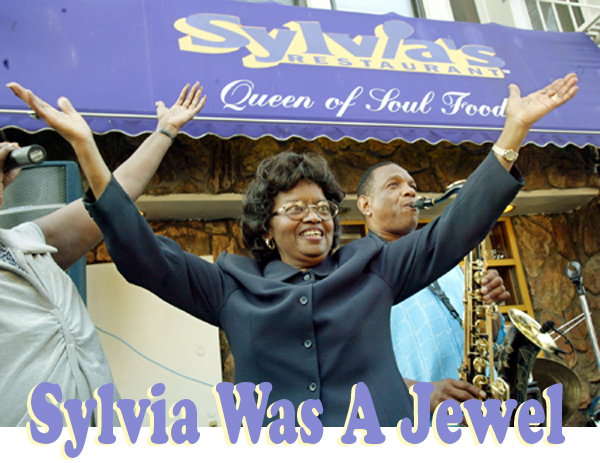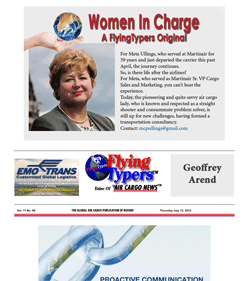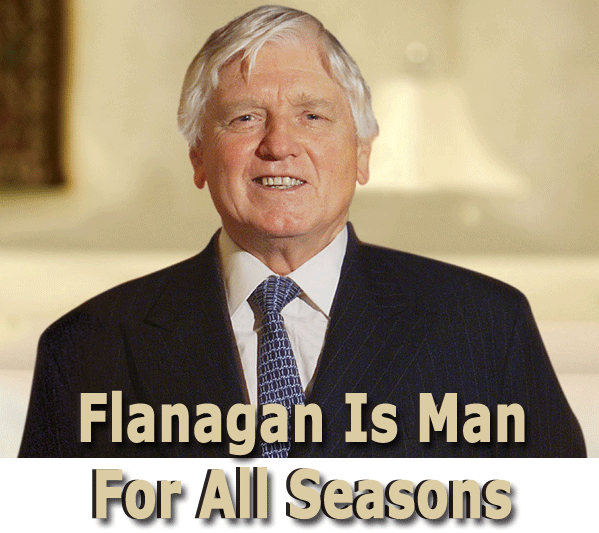
 In
case you were wondering, at age 84 Maurice Flanagan
can still be found at work in his office, just
as he has always been since the airline went into
business more than 25 years ago. In
case you were wondering, at age 84 Maurice Flanagan
can still be found at work in his office, just
as he has always been since the airline went into
business more than 25 years ago.
Today we find him
atop the Emirates Airline headquarters building
at Dubai International Airport.
Sir Maurice (he
was knighted by Queen Elizabeth II in Abu Dhabi
three years ago) was present at the creation of
Emirates Airline and is quite responsible for
launching the global air giant in 1985—and
with just two leased planes.
In 2012 he remains
at the helm as Emirates' executive vice chairman,
having recently tackled an old soccer injury that
led to the rebuilding of his right knee.
Flanagan, a native
of the U.K. and a graduate of Liverpool University,
served in the Royal Air Force in 1951 with some
dreams of a career as an international soccer
player, until he stepped in a pothole at an air
force base on Prince Edward Island and badly damaged
his knee.
Having finally addressed
his old sports injury four square, he remains
on the mend with his right leg in a brace, moving
about via a mobile support device.
Ever proud, he dismisses
his ordeal, simply saying:
“It’s
embarrassing.”
Maurice Flanagan
is remarkable for many reasons, including the
fact that age and a knee problem have taken nothing
of his determination, drive and quick mind, as
he surveys the global airline industry in general
and Emirates’ future in particular.
He has put his stamp
on an air carrier that is the match and promise
of the dynamic city it serves, moving towards
a tomorrow that seems limitless.
Building an empire
of the air whilst flying from an airport in a
small country is nothing new.
From KLM, British
Imperial Airways, Pan Am, and others that started
right after Lindbergh flew the Atlantic and changed
everything in 1927, great airlines have grown
from Amsterdam to Singapore.
But none of them
had the daring and the plan of Emirates and the
incredible geographic positioning at a true crossroads
of the world: the United Arab Emirates.
Maurice Flanagan
does not blink when asked if Emirates is out to
become the top airline in the world.
“Absolutely,”
he says with no hesitation.
“We are already
there in many categories.”
Maybe even more
remarkable is that while other airline builders
were in decline or had even seen their life’s
work diminished as they reached their senior years,
here is an airline builder octogenarian realizing
his dream of growing a great world airline, which
in 2012 continues to sprout routes all over the
world, adding more than a dozen new destinations
this year alone including three new, daily, nonstop
cities in the USA alone.
“I think every
once in a while that maybe I’ll back up
a bit,” Maurice says.
“But the Prince
says he needs me,” so the saga continues.
It is also worth
mentioning that the senior management team at
EK (many recruited by Mr. Flanagan), including
Emirates President Tim Clark, a veteran of British
Caledonian, who Maurice regards as "the best
planner in the business by miles," remains
in place despite the ups and downs of an ever
turbulent airline business.
But Maurice Flanagan
admits that so far, 2012 has been a big challenge
driven by fuel prices and softness in premium
travel.
“We are suffering
because of the cost of fuel and also the state
of the world economy.
“Last year
we made quite bit of money and paid our employees
a bonus.
“This year
when we report in a few weeks I’m afraid
that, while still profitable, there will be no
bonus.
“We will continue
to expand our global presence and have ordered
100 A380s to do just that, as well as Boeing B777s
and also the yet to come A350s that we chose over
the Boeing B787.
“A very interesting
aircraft worth thinking about is the next version
B777, which will combine today’s jet with
composites and other features of the B787; among
other attributes, it will make the B777 lighter
and even more fuel efficient.
“We expect
to know more about the next B777 during 2013.
“So we remain
bullish and in a growth mode.
“We expect
things to calm down and the business will come
back as it always does.
“Our view
is that forecasts of the airline business doubling
during the next 20 years are spot on.
“To that end,
Emirates is perfectly positioned to be a major
transportation resource, with Dubai and its new
airport capable of moving 170 million passengers
annually as our partner.
“But everyone
has to play fair and allow free access to markets.
“Right now
we have a problem with Canada and cannot access
their markets properly.
“So while
Dubai is open to anyone to serve, Emirates continues
to expand in the USA and also South America but
is thwarted by Air Canada, a financial basket
case of an airline supported by its partner, Lufthansa.
“We have flights
to Toronto and are siphoning off traffic from
Vancouver with our new Seattle flights that all
make money, but there is little else in Canada.
“Everybody
in Vancouver wants us there, but Air Canada has
us blocked.
“Interestingly,
despite Lufthansa’s actions elsewhere, we
can fly anywhere in Germany and expect to add
Stuttgart and also Berlin soon.
“It’s
very simple: we provide good service and value
for money anywhere we fly.
“Emirates
makes money and city politicians understand that
we enhance local economies and build business
connections wherever we fly.
“For example,
we now serve Buenos Aires and have traffic rights
between BA and Rio, creating new business connections
and lifting local economies all around as a result.
“It simply
makes no sense at all that protectionism in international
air service continues anywhere in the world in
2012.”
As we take our leave
while walking through the outer office and out
into the main hallway, we cannot imagine Emirates
without Maurice Flanagan.
Without a doubt
he will be here at this airline as long as he
wants to, preferring to conduct his life well
lived doing something he truly loves.
His legacy puts
this unique, one-of-a-kind gentleman at the top
for anyone who has ever dreamed of building a
great, international airline.
While Maurice is
quick to extoll the praises of Emirates Chairman
and CEO Sheik Ahmed bin Saeed Al Maktoum
as a visionary and extremely well qualified airline
builder who is without peer in modern aviation
today, and lauds the rest of the team at EK “as
exceptional,” Mr. Flanagan’s presence
at Emirates Airline can no doubt be best exemplified
by the airline's success and the adamant feelings
HH has regarding Sir Maurice's influence.
We think the Prince
is right.
Geoffrey/Flossie
|



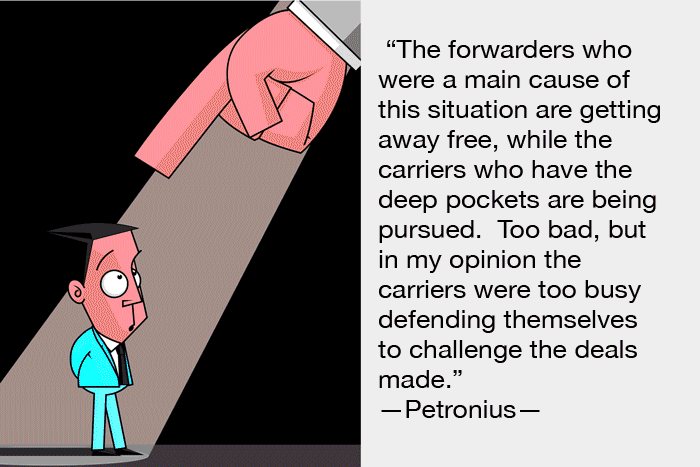

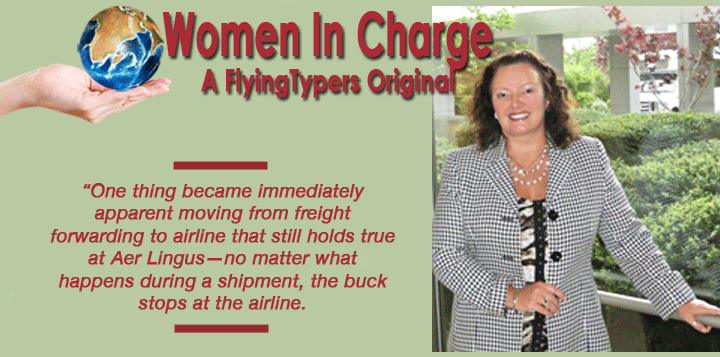


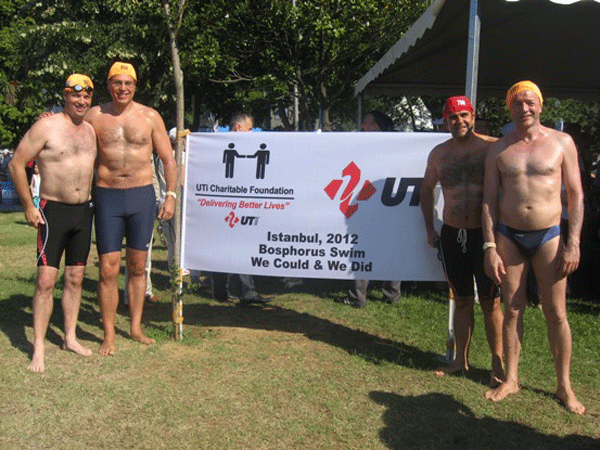

 In
case you were wondering, at age 84 Maurice Flanagan
can still be found at work in his office, just
as he has always been since the airline went into
business more than 25 years ago.
In
case you were wondering, at age 84 Maurice Flanagan
can still be found at work in his office, just
as he has always been since the airline went into
business more than 25 years ago.